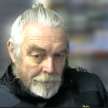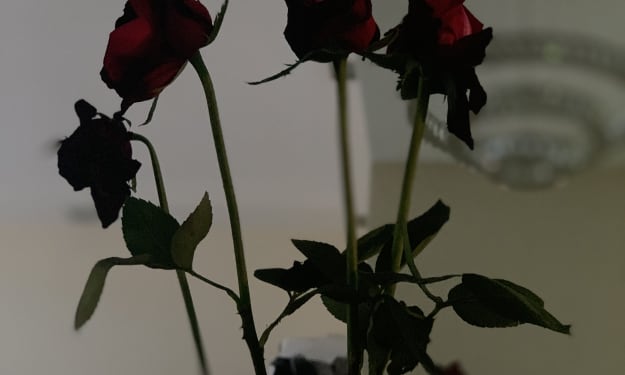The drowning of books
Dystopia is also about what may happen next

On the Tuesday when the world finally caught up with him, as the first rays of the sun cracked open the pale green eggshell of the eastern sky, Gerineldo flexed his shiny, old man’s fingers, stretched his sinewy old brown legs, prayed that his wife was not already awake beyond the clean lace curtains, and farted loudly and gratefully into the chilly stillness of the dawn.
After a pause which confirmed the ongoing pleasure of his solitude, Gerineldo conjured a cigarette from within the folds of his jacket and lit it with a flourish. Coarse blue smoke drifted on the pellucid air. His inward breath was sharp, circulating the nicotine and bringing his inner world into focus with a sudden, tight clarity. The outward breath was almost a hum, a pleasing vibration, deep within his chest. For a while he smoked and hummed along, watching the familiar shapes of distant mountains as they emerged in pale lilacs and purples far across the valley where the air would shortly shimmer and dance over the hot rock.
Out in the brush beyond the battered picket fence, a billion ants were still, their tiny bodies free from the purposeful hunger which warmth would shortly bring. Countless lizards conserved the memory of sudden startle within cool lethargic limbs, and jewellike spiders hunched and glittered in gossamer lined crevices among the prickly pears.
Gerineldo never tired of this moment, the point at which his world hung, poised and delicate on the edge of another morning. He sighed. Recently, there was the sense of something perilous even in this simple pleasure. Of course on any afternoon, all trace of this cool, clear light was driven away, and the valley became a searing furnace, a place where thirst, or the quick brown ferocity of a snake could end your life before you even knew it. But such perils were part of a nature which could be understood, appreciated and accepted. Now, though, death of a different kind had arrived here to stalk the brush.
Far away to the South, so far as to be almost beyond the imagination of a man who for all his intelligence had never moved far from the place of his birth, lay the Capital, the almost foreign province to which their son Arturo had emigrated almost a decade ago, and from which his longed-for letters would occasionally arrive. Sometimes the densely penned pages would reach them courtesy of the erratic postman, but more often it was Gerineldo’s wife who would acquire them through a mysterious process of social osmosis during her excursions into town. Gerineldo was above all practical, and it seemed to him that nature and poverty were the only sources of brutality. But Maria was a woman who understood the importance of solidarity as well as the need for poetry and connection in the struggle for political and social justice. On the bookshelves in their shared rooms, perfumed with camphor and sandalwood against the ravages of insects, the words of Paz, Marquez and Allende waited. And on uncalendared evenings, Maria would sit amidst the dizzy illumination of gently throbbing, moth-laden generator light to release them on the air, reading aloud to her husband those passages which pleased or piqued her most.
Gerineldo would listen with love to the gentle cadence of her voice, whilst continuing to gauge with his expert ear the health of the generator. Because whether its compass was defined by the generosity of the rising sun or by a tight circle of lamplight, his world was always limited by the boundary of his senses. And understanding this to be the case, Maria would make the arduous trip over the pass between the highest peaks to San Juan Puquio at least once a month, to talk with her friends there and spend a night or two with Elvira, her oldest confidante and a teacher at the municipal school. Usually she would return with one or more of Arturo’s letters as well as news of the revolution.
Arturo shared Maria’s feeling for words and at first his letters had provided Gerineldo with an almost magical transport, an escape from the daily grind of the heat and dust and the hardship of this valley, to a refuge replete with tales of nocturnal dancing and impromptu theatre, and the unimaginable luxury of the skeins of glittering lights strung carelessly between the painted buildings whose classical facades were graced by wooden shutters, narrow balconies and wrought iron railings. By day, the city’s sunlit squares became colourful markets overflowing with the drunken esters of ripening fruit and the drowsy scent of flowers. There were narrow alleys where old women sold dried plants and rare seeds from the Amazon, and dispensed carefully folded paper packets of bitter medicine. Arturo and his friends would gather to drink coffee and discuss the new politics of freedom and their hope for the future, perhaps watching the boats plying the brown waters of the lazy river or revelling in the dusty brilliance of barefoot boys playing soccer on a flat patch of red earth. Later, in the evening , they would share beer, listen to music and flirt gently with the young women who promenaded along streets in happy groups.
And for a while Arturo’s letters, and Maria’s friends, and the glowing greenish reports which issued from the newly installed television at the social club in San Juan Puquio were filled with optimism as state after state proclaimed the news that their people would at last determine their own fate and that no longer would foreign interests be permitted to subvert public morals by creating the desire for the rapacious consumption of unnecessary products.
Through all that time Gerineldo’s days and nights continued to follow the same inexorable rhythm, and though he listened with delight to Maria’s words, and cherished the visions which his son’s letters engendered in his private reverie, nevertheless the pump would break down, or the chickens would be taken by mountain lions, the ripening corn would need to be protected from rats and birds, and their fragile existence at the margin of possibility would hinge upon his attention to every detail.
It could not last of course. Such bright idealism was an intolerable challenge to the faceless giants whose sustenance is our existence, who we feed with each sip of coffee, every mouthful of bread, each litre of precious generator oil. However humbly, the hours of our toil must contribute to their welfare too. Confronted by any challenge, the sowing of discontent and lies, disinformation, fear, and the fomenting of national interests had been their stock in trade and speciality for a century since Cuba - but this time the strategy triggered a giant, unstoppable wave of darkness and brutality which spread like a tsunami across borders and nations, sweeping everything away. Arturo’s last letter was full of fear and trepidation. There were gunboats on the river and soldiers at the corners of empty streets.
The radio fell silent and for days nothing could be heard but martial music. When broadcasts resumed, a new voice, its mechanical pomposity hardly diminished by the tiny battery driven speaker proclaimed the triumph of the Southern States and its glorious new President. Everyone must register with the authorities to have their identity confirmed, and young men between eighteen and twenty five would be expected to serve at the President’s pleasure. There would be a program of investment in roads, education and railway infrastructure. The recently discovered deposits of rare minerals would be developed with the help of American expertise. Universities would be reopened once purged of subversive elements.
The President’s daughter, a child of no more than fifteen, appeared on television to reassert the sanctity of virginity and proclaim the restoration of the sacred duty of girls and women to support and protect their husbands and sons. A list of unconstitutional books was to be posted in every town and village, possession of any one of which would henceforth be a serious crime. All forms of communication would be monitored, and a secret force established to ensure security and prosperity. Cardinal Pablo Echeverria Hoyos himself broadcast a homily explaining that the poverty of Christ had been part of his sacrifice, and that humble participation in well-regulated commerce, and the enjoyment of the fruits of modern manufacture were a Christian duty.
The hand-rolled cigarette had died. Reaching into his jacket again for his lighter, Gerineldo’s fingers encountered instead the cool smooth metal of the locket. Two days back, he and his neighbour José had been returning from the distant foothills, their burros laden with tightly bound bundles of firewood. Their path wove down until it reached a place where it threaded briefly between gigantic blades of stone blunted by the passage of time and windblown sand, before opening onto a sweeping arid hillside punctuated by tufts of razor edged grasses and cactus, across which their small cavalcade cast a moving forest of crazy shadows.
A sudden eruption of flies announced the presence of the atrocity lying unhidden by the side of the rutted track. Stark, brutal and merciless, the rank evidence sprawled and jutted, obscenely spread-eagled under the ruddy light of the lowering sun. Gerineldo counted eight of them. In the desert, the macabre mechanics of our dissolution is not straightforward. Coyotes are not strong, vultures are unpredictable, and the ravages of insects and the processes of corruption can be altered by desiccation, chance and the elements. These young men had died within the last few days, but it might be months or years before the desert took the last of them. Until then, the arrogant confidence of this casual execution was meant as an unequivocal warning.
Gerineldo felt the dreadful twist deep within him, as the recollection of this place which he had passed through a thousand times since childhood was changed forever. In the space of a few heartbeats came the understanding that there was no longer any reliable authority, no registrar for these crimes which had instead become statements of absolute control, and which would, after the manner of such things, be repeated endlessly across the continent. In the face of such perversity all that he could do was stare for a moment into the dark eyes of José and mutter a brief prayer out of respect for these lost sons whose families would never know their resting place. There was nothing more to do or say. And then Gerineldo saw sunlight catch the fallen treasure, the same soft, golden heart-shaped locket which nestled now in his hand at the end of a cheap chain.
He opened it carefully, looked briefly once again at the photo of a pretty, smiling girl and the carefully curled lock of hair which it contained. Had this token of love belonged to one of those murdered boys, or to one of those who had shot them? Had her own heart quickened for a victim or a killer? It was of course, impossible to know.
Squinting again across the valley, Gerineldo’s quick eyes picked up unfamiliar movement at the horizon. No more than a long smudge of dust and the flash of glass windscreens. But it meant that it was time now to wake Maria too. Together they would drown her dangerous, beautiful books in the darkness of the deep well behind the house, and gather Arturo’s letters into a bundle which he would wrap together with the locket, to hide among the rocks in hope of better times.
About the Creator
Bob Sutton
One time painter, latter day keyboard warrior, full time software engineer and wannabe writer.






Comments
There are no comments for this story
Be the first to respond and start the conversation.